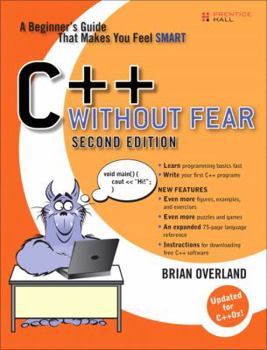C++ Without Fear: A Beginner's Guide That Makes You Feel Smart
Select Format
Select Condition 
Book Overview
Learning C++ Doesn't Have to Be Difficult Have you ever wanted to learn programming? Have you ever wanted to learn the C++ language behind many of today's hottest games, business programs, and even... This description may be from another edition of this product.
Format:Paperback
Language:English
ISBN:0132673266
ISBN13:9780132673266
Release Date:May 2011
Publisher:Prentice Hall
Length:581 Pages
Weight:0.55 lbs.
Dimensions:1.3" x 7.1" x 9.0"
Customer Reviews
customer rating | review
There are currently no reviews. Be the first to review this work.













